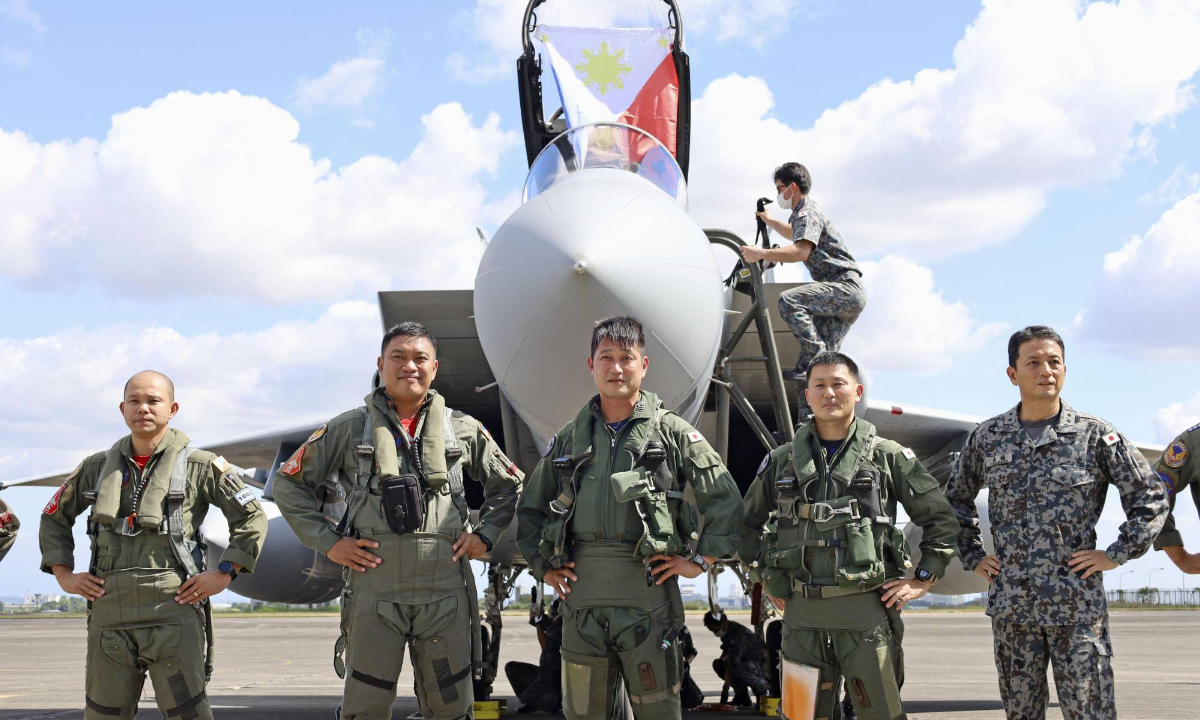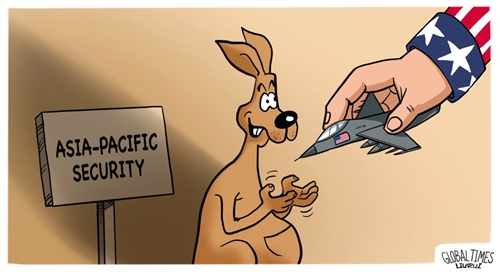Arrival of Japanese warplanes in Philippines adds more uncertainty in South China Sea: experts

Philippine Air Force (left and second from left) and Japanese Air Self-Defense Force personnel mark the historic arrival of two ASDF F-15 fighter jets with a photo at Clark Air Base in Mabalacat, north of Manila, on Tuesday. Photo: Kyodo News
Although Japan claimed that the two F-15 fighter jets it sent on Tuesday arrived in the Philippines for friendly exchanges, Chinese military experts believe that Japan's actions may add more insecurity and instability in the South China Sea.
One expert added that Japan believes that it is not a "normal country" due to the confinement of its pacifist constitution, which means that it may continue to make more "breakthroughs" in the future.
The Japan Times reported on Wednesday that two F-15 fighter jets dispatched by the Japanese Air Self-Defense Force arrived at the Clark Air Force Base in Mabalacat, Philippines on Tuesday. It is the first time since World War II that Japan has sent fighter jets to an ASEAN member state for "friendly exchanges," the report said.
The Philippines was occupied by Japan during World War II and an estimated 1.1 million civilians were killed, according to Japan's Kyodo News agency. Japanese fighter planes took off from Mabalacat's airfield during World War II, and anti-Japanese sentiment ran high among local people.
The fighters' arrival marked a milestone in the history of defense exchanges between Japan and the Philippines, the Japan Times quoted Shotaro Arisawa, an ASDF squadron commanding officer, as saying.
Lt. Gen. Connor Anthony Canlas, a Philippine Air Force commander, said last month the Japanese "are now our allies who believe in the rule of law."
Japan and the Philippines have been deepening defense collaboration. The two sides held their first "two plus two" talks between diplomatic and defense chiefs in April. Japan is exporting four units of an air defense radar system that detects incoming fighter jets and missiles. Japan has also transferred two patrol vessels to the Philippines, said a report by Nikkei Asia on Wednesday.
This is the first time that the Japanese government has exported defense equipment since it changed its arms embargo in 2014.
Japan's flight of F-15 fighter jets to the Philippines is apparently aimed at strengthening military cooperation between the two countries, so that Japan can expand its military presence in the South China Sea. But Japan is gradually handing over its retired F-15 fighter jets to the Philippines, Song Zhongping, a Chinese military expert and TV commentator, told the Global Times on Wednesday.
Japan is now eager to go overseas, with the Japanese Air Self-Defense Force trying to find overseas transit stations and footholds so as to support its military presence in distant regions. The Air Self-Defense Force, maritime Self-Defense Force and ground Self-Defense Force will try every means to boost their presence in the future, Wei Dongxu, a Beijing-based military expert, told the Global Times.
He said that judging from the current situation, the Philippines has not allowed the Japanese Self-Defense Forces to stay permanently. The infrastructure of the Clark Air Force Base is aging, and it does not have the ability to provide logistical support for a large number of advanced fighter jets.
"If the defense cooperation between Japan and the Philippines involves infrastructure, such as technological transformation and improvement of air bases and airfields, then the deployment of Japanese military forces can be seen more clearly. But in any case, Japan's efforts will add more insecurity and instability in the South China Sea," Wei noted.
Wei explained that the US plays a big role in the defense cooperation between Japan and the Philippines, and hopes to bring together its allies in the Asia-Pacific region, including Japan and Australia, for joint military operations. The US also hopes that Japan can find a foothold around the South China Sea to rest and resupply, so as to better assist the US military to carry out various military operations.
The phrase "for the first time since World War II" has begun to appear again. On September 28, three German warplanes arrived in Japan for a three-day joint training exercise with the Japanese Air Self-Defense Force, which is the first time since World War II that the two sides have held drills in Japanese airspace.
In this regard, Song said that Japan may take more and more similar actions in the future, because Japan has always believed that it is subject to the pacifist Constitution and is an "abnormal country". If it wants to become a "normal country," it means that it has to break the restrictions imposed by the constitution in various ways.
However, Song believes that the key reason why Japan is not a "normal country" lies in its failure to have a correct understanding of historical issues, and that is the core problem.

